Do you love beets but are afraid they will spike your blood sugars? Or worse, maybe someone has told you that you need to limit root vegetables because of their starch content, and now you are unsure what you should do?
Well, you’re in luck, because in this post we are going to cover if beetroot is good for diabetes and what benefits they provide. We’ll also look at how they compare to other root veggies and some delicious ways to add them to your diet.
DISCLAIMER: This post was written by Justine Chan MHSc, RD, CDE. All content on this site is for informational purposes only and is not a substitute for professional medical or nutritional advice. Always seek medical and dietary advice from your doctor or dietitian.
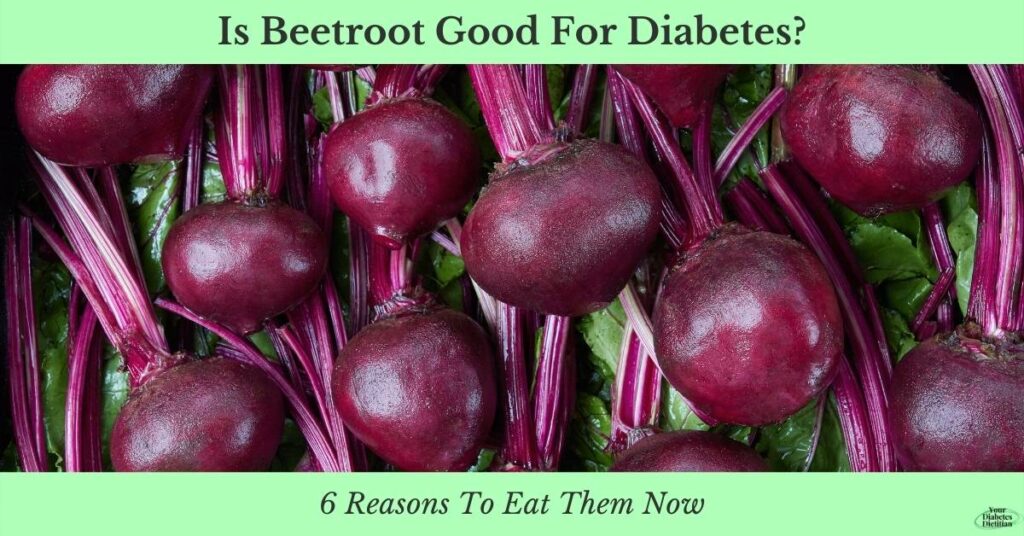
But first things first, let’s take a look at the nutritional content of beets.
Table of Contents
Nutrition scorecard
Beets are a root vegetable, just like rutabagas, potatoes, and parsnips. Not only are they high in nitrates, but they’re also a great source of betalains, flavonoids, and polyphenols. All of these have anti-oxidant and anti-inflammatory benefits.
All nutrition information is sourced from food labels or USDA Nutrient Database.
A half cup of cooked beets contains:
- 37 kcal
- 7 g of carbohydrates
- 2 g of fiber
- 0g of fat
- 259 mg of potassium (6% Daily Value)
- 3mg of vitamin C (3% Daily Value)
- 68 ug of folate (17% Daily Value)
- 18ug beta carotene
- 65mg sodium (3% Daily Value)
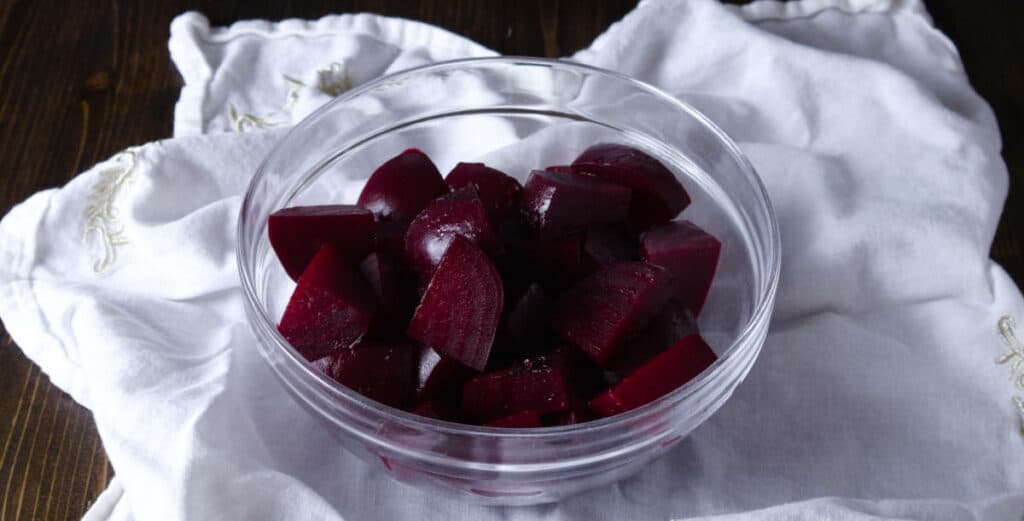
To give some perspective, let’s compare the nutrition facts of beets to some other common root vegetables that you might use as a carbohydrate source in a meal. You’ll find the best values for each nutrient highlighted below.
| Food (½ cup cooked) | Beets | Rutabaga | Baked Potato |
| Calories (kcal) | 37 | 26 | 57 |
| Carbohydrates (g) | 8 | 6 | 13 |
| Fiber (g) | 2 | 2 | 1 |
| Fat (g) | 0 | 0 | 0 |
| Potassium (mg) | 259 | 184 | 239 |
| Vitamin C (mg) | 3 | 16 | 8 |
| Folate (ug) | 68 | 13 | 6 |
| Beta carotene (ug) | 18 | 1 | 0 |
When asking if beetroot is good for diabetes, they look pretty great as a carb choice from what we can see above! They are low in carbs and a good source of fiber and antioxidants.
Glycemic Index and Glycemic Load of Beets
Glycemic index and load are tools you can use to determine how a food will affect your blood sugar. The glycemic index value of beets is 64 (1). Foods scored between 1 and 55 are considered low glycemic index foods, foods between 55 to 70 are medium on the glycemic index, and above 70 is considered high.
This means beets are considered a medium glycemic index food.
This might cause you to worry a little if you’re concerned about whether beets will spike your blood sugars. But to understand the real effect beets will have on blood sugars, you need to calculate the glycemic load for the serving of beets you plan to have.
A cup of cooked beets has 14 grams of net carbs, which by using the glycemic load calculation (GI of food x carbs in serving / 100), gives us a glycemic load of around 9.
With a glycemic load score of 9, a one cup serving of beets would be considered low glycemic load.
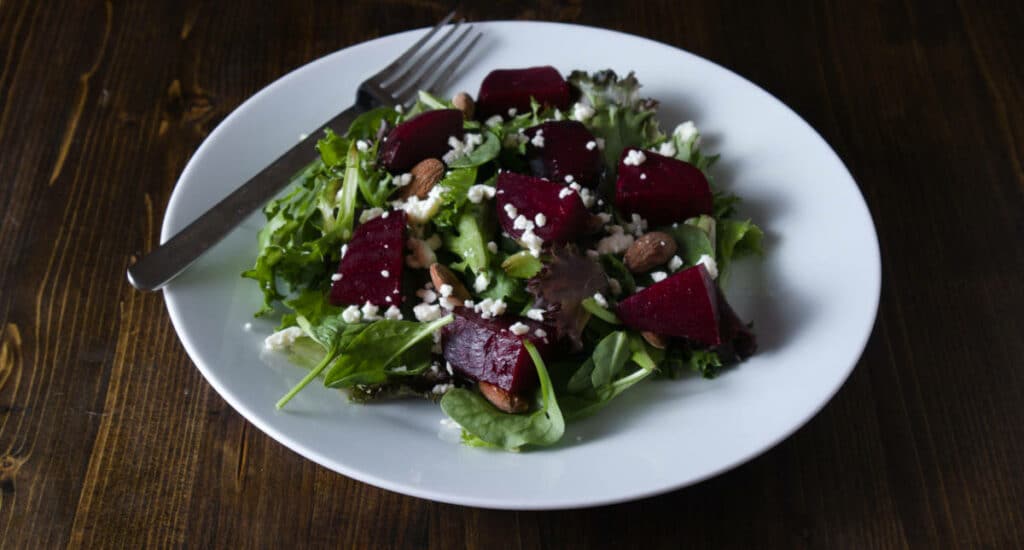
Pickled Beets
Pickled beets are a common way people enjoy beets. They are generally pickled in a sweet brine, and contain significantly more sugar than a regular cooked beet.
A half cup of pickled beets contains 19 grams of carbs, whereas the same amount of cooked beets contains only 8 grams. Therefore, the pickled beets have more than double the amount of carbs compared to whole cooked beets.
Pickled beets also have more than two times the amount of sodium compared to whole cooked beets.
If eating pickled beets, try to consume them with a source of protein or fiber to reduce the overall effect on your blood sugars.
Half cup of pickled beets contains:
- 74 kcal
- 19 g carbohydrates
- 1 g of fiber
- 130 mg of potassium (3% Daily Value)
- 5 mg of vitamin C (6% Daily Value)
- 61 ug of folate (15% Daily Value)
- 66 ug beta carotene
- 169mg sodium (7% Daily Value)
Beets vs Beetroot Juice
You may be wondering, is beetroot juice good for diabetes? Many of the studies looking at the benefits of beets used its juice as part of the intervention, probably because it was convenient. Beetroot juice can be purchased, or made from scratch using a juicer.
Purchased beet juice may contain other additives or flavorings. If you’re juicing beets, an 8 ounce serving will likely require two beets. You’re also consuming more sugar and less fiber in the juice than if you were to eat the beet whole.
Nutrition values may differ slightly depending on how the different manufacturers extract the juice from the beets. In general, per 8 ounces, beetroot juice has 70kcal, 18 grams of carbohydrates and one gram of fiber.
Beet Greens
Did you know that in Ancient Rome, they grew beets for their greens rather than the beetroot itself? Beets are from the same species of plant as swiss chard, another leafy green vegetable with some amazing health benefits. Plus, the beet greens taste just as good!
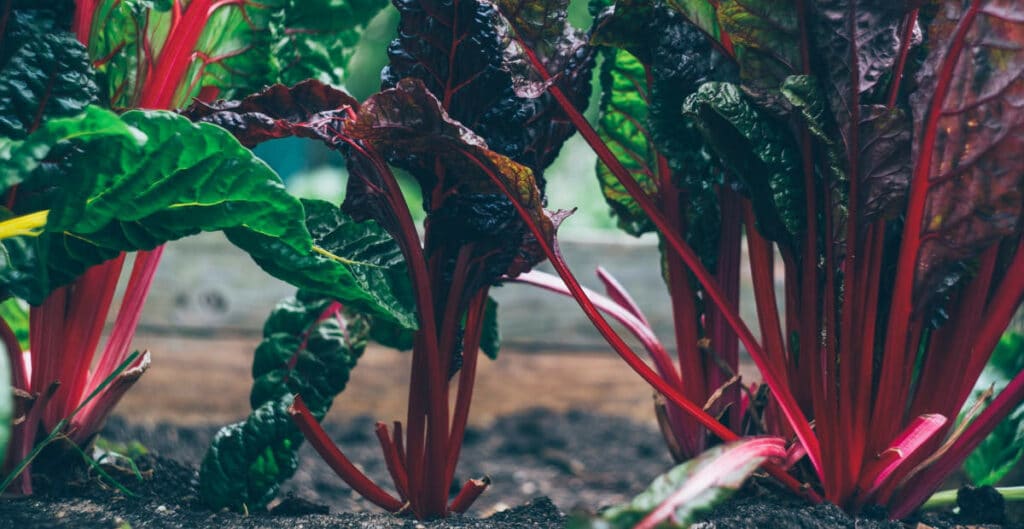
Beet greens can be eaten either raw or cooked. When consumed raw, they are great as a leafy ingredient in a salad. When cooked, they can be used in the same manner as chard or spinach.
By buying beets with the greens attached, this effectively gives you two dishes for the price of one. Not many other foods can offer this kind of value.
Below you’ll find the nutritional breakdown of raw and cooked beet greens. As you can see, you’re getting a good dose of beta carotene, lutein and zeaxanthin, all of which can protect your eyes.
| Beet greens (½ cup) | Raw | Cooked |
| Calories (kcal) | 4 | 35 |
| Carbohydrates (g) | <1 | 3 |
| Fiber (g) | 1 | 3 |
| Potassium (mg) | 145 | 595 |
| Vitamin C (mg) | 6 | 16 |
| Folate (ug) | 3 | 9 |
| Beta Carotene (ug) | 720 | 2820 |
| Lutein + Zeaxanthin (ug) | 285 | 1120 |
Health benefits
A great Source of folate
Beets are a good source of folate. This can be important to people with diabetes who take metformin as part of their treatment plan.
In a recent study, metformin was found to cause lower levels of vitamin b12 and folate (2). Having a dietary source of folate such as beets can help compensate for this.
Rich in beta carotene
Do you think carrots are the only vegetable containing beta carotene? Well, beets are also a good source of this vital antioxidant.
In a 2020 review, beta carotene was found to be protective against type 2 diabetes and may be low in people with type 2 diabetes. This review also found that beta carotene may play a role in reducing body fat and cholesterol (3).
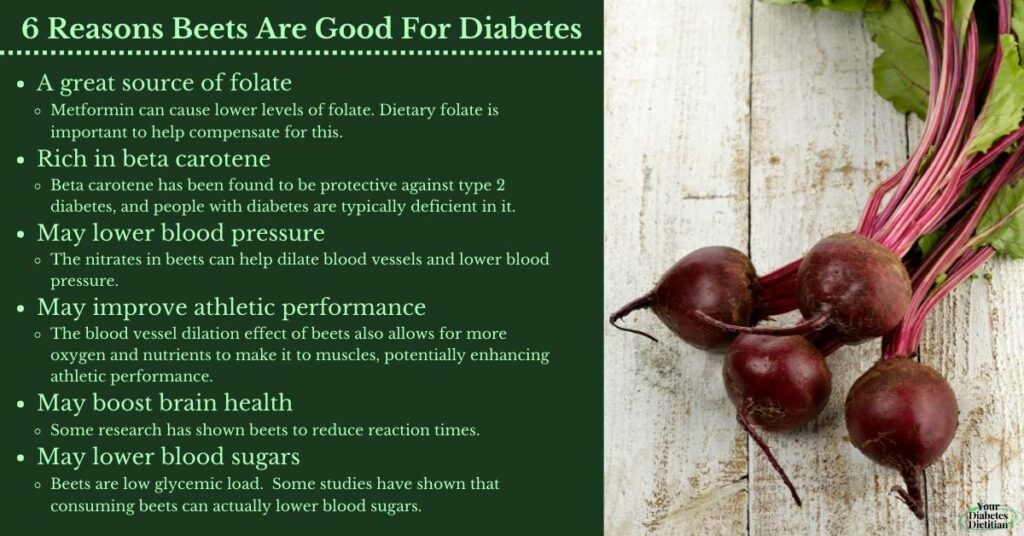
May lower Blood pressure
You probably have heard that beets are rich in nitrates. Nitrates convert into nitric oxide in your body and open up your blood vessels to allow blood to flow more easily (4).
A randomized controlled trial with 15 young people found that beetroot juice lowered their blood pressure, with the biggest effect after 30 minutes (5). It is the nitrates in beets that are primarily responsible for lowering your blood pressure (6).
May improve Athletic performance
Not only are beets full of nitrates, they also boast anti-inflammatory and antioxidant benefits, thanks to their polyphenols and betalains which give them their bright red color (7).
As mentioned previously, beets also help to dilate your blood vessels, allowing more oxygen and nutrients to pass through your body to your muscles. Because of this, beets can increase your muscular power (8) as well as lengthen the time before you get tired (4, 9).
Beets may also reduce muscle soreness and damage that comes with exercise (7, 10).
May boost Brain health
In people with type 2 diabetes, beets were found to reduce your reaction time (10). Because beets open up your blood vessels, it can result in more blood flow to your prefrontal cortex, the part of your brain that’s involved in memory and decision making (10).
May Lower blood sugar
While research on beets is limited to either small groups of people without diabetes or mice, these studies have found that beetroot can lower blood sugars after eating (10, 11). Beets can also help boost your brain power, lower your fasting blood sugars and A1c, among other benefits. One study showed results in just 8 weeks using 100 grams of raw beets daily (12). How is this possible?
One theory is that the nitrates may improve blood flow to your pancreas, which then allows your body to use insulin more effectively (11). It could also be because of the polyphenols in beets, which have been shown to delay the digestion of starch and reduce blood sugar spikes (13). While the exact cause is unknown, this is a compelling health benefit when determining if beetroot is good for diabetes.
What are the side effects of beetroot juice? What are the disadvantages of beetroot?
Generally, beets have no side effects. No interactions with medications have been found.
The most common side effect is beeturia, which is when your urine turns red. This happens in 10 to 14% of people (14). The effect is harmless however, and goes away quickly.
Beets are naturally high in oxalates. If you’re a person that’s prone to have kidney stones, you may want to limit the amount of beets you eat. However, less than 10% of oxalate from foods is absorbed (15).
If you’ve had kidney stones before, it’s ideal if you can confirm what type it is at the lab, but if not most kidney stones are made of calcium and oxalate crystals.
To work around this, make sure you drink at least 10 to 12 cups of fluids daily to help dilute your urine. Also, pair beets and other high oxalate foods with a source of calcium to help bind the oxalate from your foods so less of it gets absorbed in your body.
Also, beets are high in potassium at 259 milligrams per half cup serving, which is great for regulating your heartbeat and ensuring your muscles work properly. Not so good if you have kidney problems though, because it’s this vital organ that helps to keep your potassium in normal range. High levels of potassium can cause a heart attack, so if you also have kidney disease, you may need to limit your intake of high potassium foods.
How to add beetroot to your diet
Beets can be added raw or cooked to your diet. Raw beets make a great addition as a garnish for a soup or salad. When cooked, they make a great choice as a side dish.
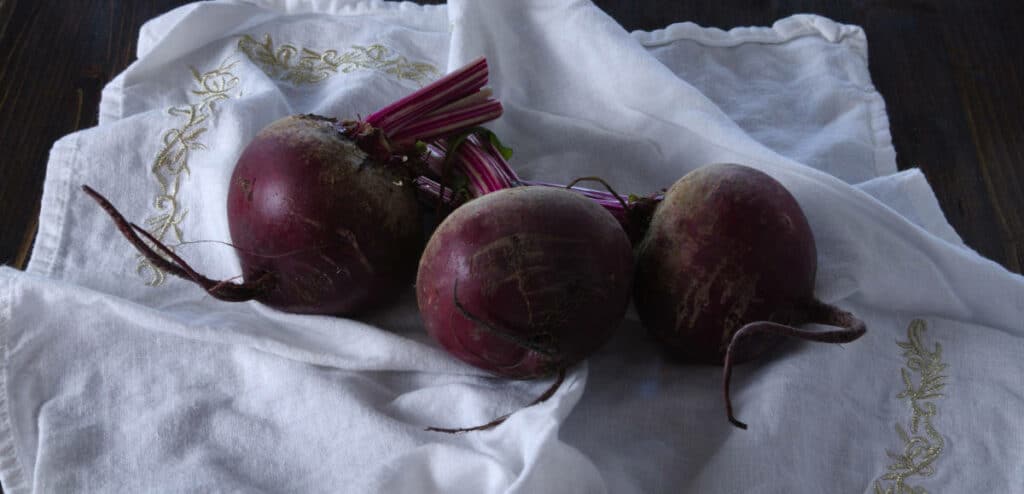
And don’t forget the leaves! They are delicious in a salad or sautéed as a vegetable side dish.
If you are worried about the effect beets will have on your blood sugar, pair with a source of protein. Cheese or nuts make for a great combination!
Some other ideas for beets:
- Add spiralized beets to salads or as a “noodle” base
- Blend in smoothies
- Add to soups or hummus
- Use as a topping for your grain or power bowl
- Dollop with greek yogurt and pumpkin seeds
- Make a beet “sandwich” with some cheese and a few slices
- Roast in the oven along with other root vegetables as a colourful side dish
How to buy, store, and cook beets
Beets are at their healthiest when consumed raw, since cooking or pickling can reduce the antioxidants present in them. However, when consumed raw they are typically used as a garnish as they are very tough.
Beets are best kept in the crisper section of your refrigerator. They can last a few weeks raw, or up to 5 days cooked.
A simple way to prepare them is to roast them in the oven for an hour. Place either the whole beet or beet halves in aluminum foil, add a bit of water, oil, salt and pepper, and seal the foil.
Cook at 375 for an hour, or until you can easily pierce the beets with a fork. To remove the skins, simply run them under cold water and use your fingers to push the skins off.
Another way to retain the nutrients you are getting from beets is to steam them. Depending on the size of your beet pieces, it should take 15 to 30 minutes in the steamer basket over boiling water to cook.
If you’re looking for convenience, you can also purchase them precooked and frozen. This avoids the mess that often comes with cooking beets. I’m sure you know beets have a tendency to stain everything they touch!
Key takeaways: Are beets good for diabetes?
So, is beetroot good for diabetes? In this article, we have seen why you don’t need to be afraid of including beets in your diet if you have diabetes. In most cases, the greatest danger posed by beets is if someone drops one on your tablecloth and stains it!
Beets are a root vegetable with a low glycemic load for a typical serving. The folate, antioxidants, and nitrates present in beets may produce a number of impressive health benefits for people with diabetes and people who exercise.
If roasting beets for an hour in the oven seems a daunting task, they can be purchased pre-cooked and frozen for a much easier and cleaner preparation. In raw form, they make a great garnish for a soup or salad.
So if you love beets, keep on enjoying them! And if you have never tried them, why not see what all the fuss is about?
Do you have a way you like to include beets in your diet? Tell us about it in the comments!

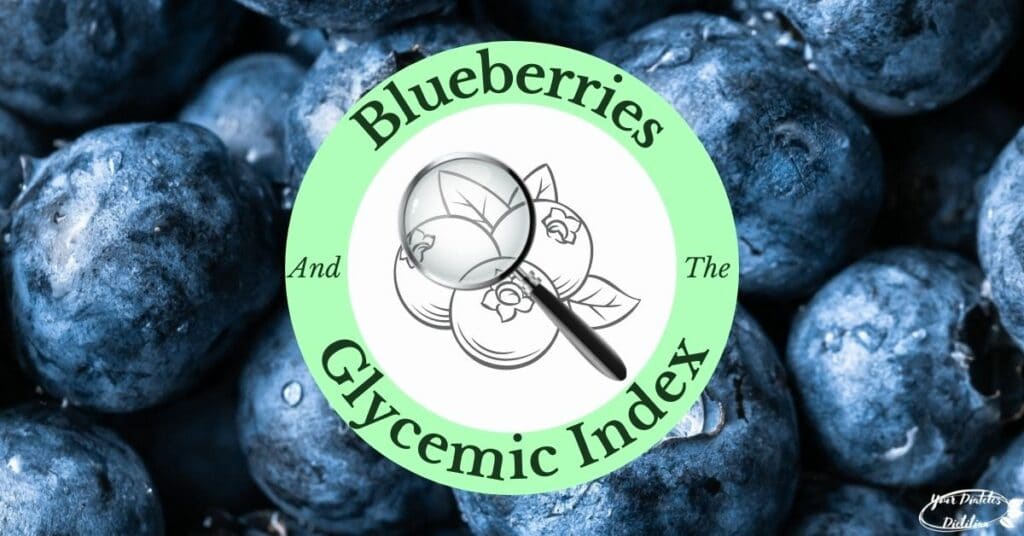
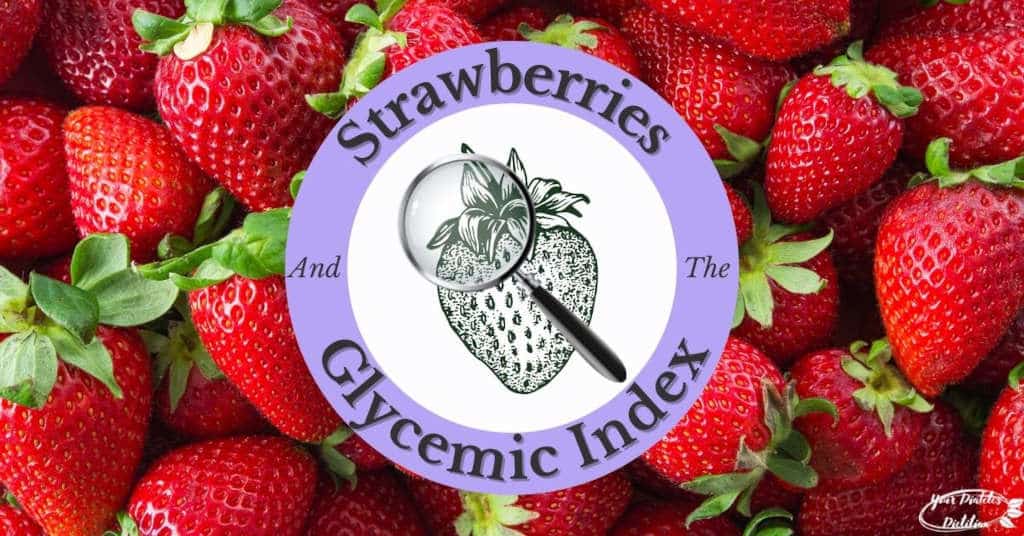
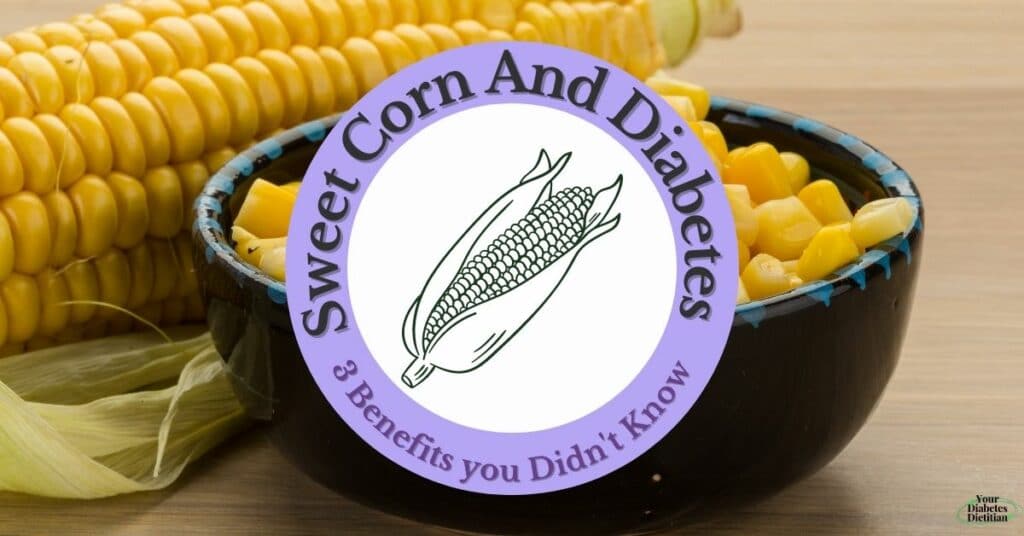

Wohh exactly what I was looking for, appreciate it for posting.
You are a very capable person!